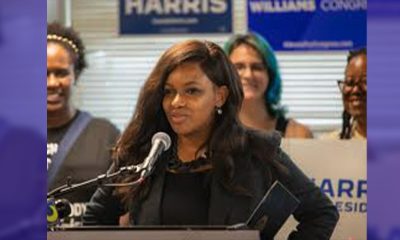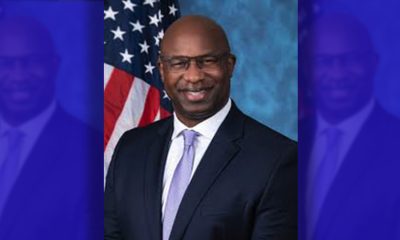Politics
Bush, Clinton Taking Different Tracks on Potential Matchup

In this April 7, 2015, file photo, former Florida governor and potential Republican presidential candidate Jeb Bush applauds a speaker during an energy forum which he hosted, at the Brown Palace Hotel in Denver. To judge them solely by their travels over the past month, you might think Bush has already plunged into the general election and Hillary Rodham Clinton has a serious fight on her hands for the Democratic nomination. (AP Photo/Brennan Linsley, File)
THOMAS BEAUMONT, Associated Press
JULIE PACE, Associated Press
DES MOINES, Iowa (AP) — To judge them solely by their travels over the past month, you might think Jeb Bush has already plunged into the general election and Hillary Rodham Clinton has a serious fight on her hands for the Democratic nomination.
Whereas the conventional thinking, at least, is quite the opposite: He’s got a real primary race to settle first and she doesn’t.
Bush, who has yet to declare his candidacy for the Republican nomination, has been stopping in states far from the early testing grounds of Iowa and New Hampshire. Over the past month, he’s made appearances in Ohio, North Carolina and Colorado, all crucial general election states.
On Saturday, he’ll be in Virginia, which will also be hotly contested in November 2016, even as most of his Republican nomination rivals are appearing in South Carolina — an important state in the primary race.
“It’s a conscious effort, as he goes through the consideration process, to talk to and hear from people across the board,” Bush spokesman Tim Miller said. “That means in the early primary states and other states that would play a role in the process.”
Bush’s strategy carries potential risks. Voters in early primary and caucus states are used to personal attention from candidates and could see Bush’s apparent flirtation with the general election as premature. Clinton, in contrast, is narrowly focusing her travel schedule on the first four states in the primaries, suggesting she wants voters to know she’s taking nothing for granted despite her dominant position in the party.
To be sure, Bush isn’t avoiding the early states. He’s made visits to Iowa and New Hampshire, as well as South Carolina and Nevada, which round out the first four primary contests, and is headed back to Nevada and Iowa next week.
Also, he does not have paid staff on the ground in the battleground states.
But a candidate’s time remains one of any campaign’s most valuable assets and how and where the candidate spends it provides the clearest glimpse into their strategy.
Bush’s relentless travel schedule has been largely driven by his aggressive fundraising campaign. But he took time out in Ohio last month to speak to the influential Ohio Chamber of Commerce conference, a coveted speaking engagement in a perennial swing state.
This weekend, Bush will give the commencement address at Liberty University in Virginia, a state that Democrat Barack Obama carried twice. In just the past month, Bush has also spoken in Colorado and North Carolina.
Ohio, Virginia, Colorado and North Carolina were each decided by less than five percentage points in the 2012 election, and are expected to be pivotal in 2016.
Since announcing her campaign in early April, Clinton has limited her campaign appearances to Iowa, New Hampshire and Nevada. She also plans to travel to South Carolina in the coming weeks.
It’s not a liability for Bush to dip a toe into a key fall election state, because such travel is still a priority, said veteran GOP presidential adviser Charlie Black.
“Your first driving force is fundraising,” he said, referring to travel plans. “Second is early-primary states and third is swing states. Sometimes it’s a major speech, or a national speech that’s driving them.”
Black presumed that Clinton would alter her schedule under the right conditions.
“If there were a NARAL conference in St. Louis, you can bet she’d be there,” he said, referring to the pro-abortion-rights group.
Clinton’s campaign is initially raising money for the primaries, not the general election.
But it’s clear she is keeping an eye on Bush, who is viewed by many of her advisers as the toughest potential GOP candidate in a general election.
For example, Clinton had planned to wait until May to start headlining fundraising events. However, she told aides that because Bush was raising money at such an aggressive pace, she needed to pick up her pace on that front. Fundraisers were added to her April schedule in New York and Washington.
Campaign officials said Clinton’s travel plans haven’t been swayed by Bush’s flirtation with general election states. They don’t expect her to appear in states such as Ohio until late summer at the earliest.
But her team is looking for other ways to engage the general election states. Campaign chairman John Podesta met donors in Colorado on Monday and is expected to make similar stops in states that will be crucial on Election Day.
The campaign has also pledged to have employees in all the states, working with volunteers and organizing efforts to get out the vote.
While campaign officials said those efforts are currently focused on the primaries, they are also a way to start building a foundation for the general election.
Copyright 2015 The Associated Press. All rights reserved. This material may not be published, broadcast, rewritten or redistributed.
Activism
OP-ED: AB 1349 Puts Corporate Power Over Community
Since Ticketmaster and Live Nation merged in 2010, ticket prices have jumped more than 150 percent. Activities that once fit a family’s budget now take significant disposable income that most working families simply don’t have. The problem is compounded by a system that has tilted access toward the wealthy and white-collar workers. If you have a fancy credit card, you get “presale access,” and if you work in an office instead of a warehouse, you might be able to wait in an online queue to buy a ticket. Access now means privilege.

By Bishop Joseph Simmons, Senior Pastor, Greater St. Paul Baptist Church, Oakland
As a pastor, I believe in the power that a sense of community can have on improving people’s lives. Live events are one of the few places where people from different backgrounds and ages can share the same space and experience – where construction workers sit next to lawyers at a concert, and teenagers enjoy a basketball game with their grandparents. Yet, over the past decade, I’ve witnessed these experiences – the concerts, games, and cultural events where we gather – become increasingly unaffordable, and it is a shame.
These moments of connection matter as they form part of the fabric that holds communities together. But that fabric is fraying because of Ticketmaster/Live Nation’s unchecked control over access to live events. Unfortunately, AB 1349 would only further entrench their corporate power over our spaces.
Since Ticketmaster and Live Nation merged in 2010, ticket prices have jumped more than 150 percent. Activities that once fit a family’s budget now take significant disposable income that most working families simply don’t have. The problem is compounded by a system that has tilted access toward the wealthy and white-collar workers. If you have a fancy credit card, you get “presale access,” and if you work in an office instead of a warehouse, you might be able to wait in an online queue to buy a ticket. Access now means privilege.
Power over live events is concentrated in a single corporate entity, and this regime operates without transparency or accountability – much like a dictator. Ticketmaster controls 80 percent of first-sale tickets and nearly a third of resale tickets, but they still want more. More power, more control for Ticketmaster means higher prices and less access for consumers. It’s the agenda they are pushing nationally, with the help of former Trump political operatives, who are quietly trying to undo the antitrust lawsuit launched against Ticketmaster/Live Nation under President Biden’s DOJ.
That’s why I’m deeply concerned about AB 1349 in its current form. Rather than reining in Ticketmaster’s power, the bill risks strengthening it, aligning with Trump. AB 1349 gives Ticketmaster the ability to control a consumer’s ticket forever by granting Ticketmaster’s regime new powers in state law to prevent consumers from reselling or giving away their tickets. It also creates new pathways for Ticketmaster to discriminate and retaliate against consumers who choose to shop around for the best service and fees on resale platforms that aren’t yet controlled by Ticketmaster. These provisions are anti-consumer and anti-democratic.
California has an opportunity to stand with consumers, to demand transparency, and to restore genuine competition in this industry. But that requires legislation developed with input from the community and faith leaders, not proposals backed by the very company causing the harm.
Will our laws reflect fairness, inclusion, and accountability? Or will we let corporate interests tighten their grip on spaces that should belong to everyone? I, for one, support the former and encourage the California Legislature to reject AB 1349 outright or amend it to remove any provisions that expand Ticketmaster’s control. I also urge community members to contact their representatives and advocate for accessible, inclusive live events for all Californians. Let’s work together to ensure these gathering spaces remain open and welcoming to everyone, regardless of income or background.
Activism
Oakland Post: Week of December 31, 2025 – January 6, 2026
The printed Weekly Edition of the Oakland Post: Week of – December 31, 2025 – January 6, 2026

To enlarge your view of this issue, use the slider, magnifying glass icon or full page icon in the lower right corner of the browser window.
Activism
2025 in Review: Seven Questions for Assemblymember Lori Wilson — Advocate for Equity, the Environment, and More
Her rise has also included several historic firsts: she is the only Black woman ever appointed to lead the influential Assembly Transportation Committee, and the first freshman legislator elected Chair of the California Legislative Black Caucus. She has also been a vocal advocate for vulnerable communities, becoming the first California legislator to publicly discuss being the parent of a transgender child — an act of visibility that has helped advanced representation at a time when political tensions related to social issues and culture have intensified.

By Edward Henderson, California Black Media
Assemblymember Lori D. Wilson (D-Suisun City) joined the California Legislature in 2022 after making history as Solano County’s first Black female mayor, bringing with her a track record of fiscal discipline, community investment, and inclusive leadership.
She represents the state’s 11th Assembly District, which spans Solano County and portions of Contra Costa and Sacramento Counties.
Her rise has also included several historic firsts: she is the only Black woman ever appointed to lead the influential Assembly Transportation Committee, and the first freshman legislator elected Chair of the California Legislative Black Caucus. She has also been a vocal advocate for vulnerable communities, becoming the first California legislator to publicly discuss being the parent of a transgender child — an act of visibility that has helped advanced representation at a time when political tensions related to social issues and culture have intensified.
California Black Media spoke with Wilson about her successes and disappointments this year and her outlook for 2026.
What stands out as your most important achievement this year?
Getting SB 237 passed in the Assembly. I had the opportunity to co-lead a diverse workgroup of colleagues, spanning a wide range of ideological perspectives on environmental issues.
How did your leadership contribute to improving the lives of Black Californians this year?
The Black Caucus concentrated on the Road to Repair package and prioritized passing a crucial bill that remained incomplete during my time as chair, which establishes a process for identifying descendants of enslaved people for benefit eligibility.
What frustrated you the most this year?
The lack of progress made on getting Prop 4 funds allocated to socially disadvantaged farmers. This delay has real consequences. These farmers have been waiting for essential support that was promised. Watching the process stall, despite the clear need and clear intent of the voters, has been deeply frustrating and reinforces how much work remains to make our systems more responsive and equitable.
What inspired you the most this year?
The resilience of Californians persists despite the unprecedented attacks from the federal government. Watching people stay engaged, hopeful, and determined reminded me why this work matters and why we must continue to protect the rights of every community in our state.
What is one lesson you learned this year that will inform your decision-making next year?
As a legislator, I have the authority to demand answers to my questions — and accept nothing less. That clarity has strengthened my approach to oversight and accountability.
In one word, what is the biggest challenge Black Californians are facing currently?
Affordability and access to quality educational opportunities.
What is the goal you want to achieve most in 2026?
Advance my legislative agenda despite a complex budget environment. The needs across our communities are real, and even in a tight fiscal year, I’m committed to moving forward policies that strengthen safety, expand opportunity, and improve quality of life for the people I represent.
-

 Bay Area4 weeks ago
Bay Area4 weeks agoPost Salon to Discuss Proposal to Bring Costco to Oakland Community meeting to be held at City Hall, Thursday, Dec. 18
-

 Activism4 weeks ago
Activism4 weeks agoMayor Lee, City Leaders Announce $334 Million Bond Sale for Affordable Housing, Roads, Park Renovations, Libraries and Senior Centers
-

 Activism4 weeks ago
Activism4 weeks agoOakland Post: Week of December 10 – 16, 2025
-

 Activism4 weeks ago
Activism4 weeks agoOakland School Board Grapples with Potential $100 Million Shortfall Next Year
-

 Arts and Culture4 weeks ago
Arts and Culture4 weeks agoFayeth Gardens Holds 3rd Annual Kwanzaa Celebration at Hayward City Hall on Dec. 28
-

 Activism4 weeks ago
Activism4 weeks ago2025 in Review: Seven Questions for Black Women’s Think Tank Founder Kellie Todd Griffin
-

 Advice4 weeks ago
Advice4 weeks agoCOMMENTARY: If You Don’t Want Your ‘Black Card’ Revoked, Watch What You Bring to Holiday Dinners
-

 Activism4 weeks ago
Activism4 weeks agoAnn Lowe: The Quiet Genius of American Couture






















































